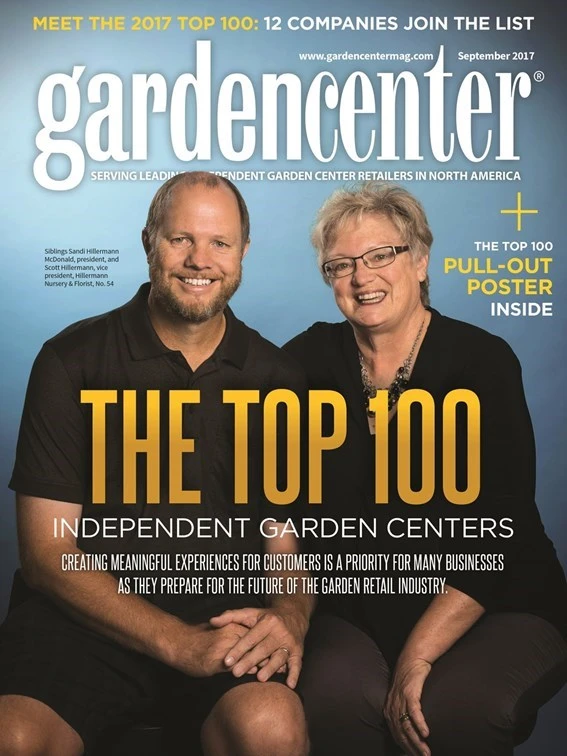
Located in Seattle’s University Village shopping center, Ravenna Gardens is known for exuberant container designs and stunning visual displays. We spoke with owner Gillian Mathews about the secrets behind her success.
Q: How does your location and the university community factor in?
A: University Village is the most successful shopping center in the Seattle area. It’s an outdoor shopping center. It’s locally owned, and it stands on its own. We have a lot of national tenants and then a really good mix of local tenants, too.
It’s definitely a regional shopping center more than a neighborhood shopping center. A lot of students work in University Village, but our shoppers are regional.
Q: What are your core strengths and most popular categories?
A: The store is focusing on the urban, small-space gardener. That would be the core. We do a lot of container gardening. Container design has always been a strength of ours. We have a designer on staff, and she also does our visual merchandising.
There is a huge growth in houseplants and interior plants being pushed from the younger generation. Little pots and little plants are a very big deal. There was a time when we wondered if young people were ever going to get involved, and here they are. They’re coming through vegetable gardening and then also through the interior design side.

Q: How important is your social media presence?
A: Well, we’ve been in business for 18 years, and I’ve only been doing Instagram for two, so it’s new. I just happen to love Instagram. I think social media is really important in reaching the next generation. They’re such visual people, and there’s nothing better than a garden store for visual. You don’t have to look far to find a great photograph. I think it’s important in marketing to that specific generation of upcoming gardeners.
Q: What’s the source of your inspiration?
A: I’m a gardener. My background is retail. I had another business before this one, and then I just kind of put my two passions together. I have no horticultural training, but I’m very involved in the local horticultural community. I’m on the board of the Northwest Horticultural Society, and I do garden tours.
I love to travel and visit other people’s gardens. Design is really something I love. I think it’s really important to get out of your own area.
Q: How have Seattle’s minimum wage increases affected business?
A: I don’t think it’s really been tested because we’re enjoying a very vibrant economy here at the moment. Amazon, Microsoft, Boeing; they’re all doing very well, so I think the test may be when there’s a downturn. At the moment, it really is fine. Living in the city is expensive, so I was never against it.


Q: What have been your biggest challenges?
A: The biggest challenge we’ve faced as a business is that we grew it very quickly. Then we had the downturn in 2007 and 2008, and that was really a challenging time. We went back to one store [from two] and it’s been just great.
The other thing for us is that we’re a really small space. We’re a very unusual business model for the nursery industry. We’re a specialty retailer, and it’s a very small space to be doing what we’re doing. We have a total of 2,500 square feet, including the outside. We do close to $900 per square foot.
Q: What are your top priorities for the future?
A: Keep listening to the next generation because they are the future. Keep encouraging them and informing them. Also, this is not one person in this business; it’s a group, a great team. I think that it’s really important to just make sure we’re all still having a good time — and make some money at the same time.
 | The Garden Center Conference & Expo, presented by Garden Center magazine, is the leading event where garden retailers come together to learn from each other, get inspired and move the industry forward. Be sure to register by April 17 to get the lowest rates for the 2025 show in Kansas City, Missouri, Aug. 5-7.
|

Explore the September 2017 Issue
Check out more from this issue and find your next story to read.
Latest from Garden Center
- From drab to fab: How garden centers can sell more drought tolerant plants
- Trends: Proven Winners 2025 perennial survey shows strong demand
- Online registration opens for 2025 Farwest Show
- Retail Revival: Cultivating sustainability at independent garden centers
- Rhododendron renaissance: Holden Forests & Gardens using research to improve commercial plants
- Boxed in: 2025 Axiom Gardening Outlook Study explores big box vs IGCs
- The Growth Industry Episode 3: Across the Pond with Neville Stein
- Sustainabloom launches Wholesale Nickel Program to support floriculture sustainability








